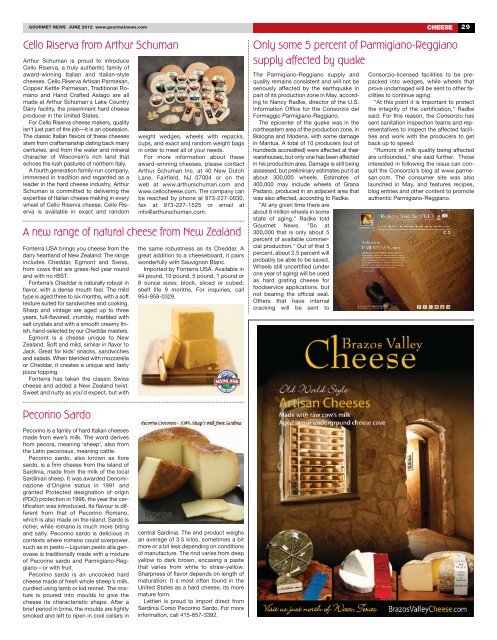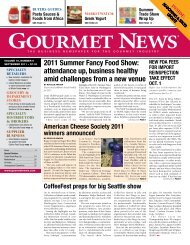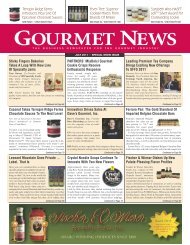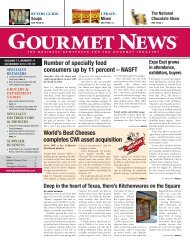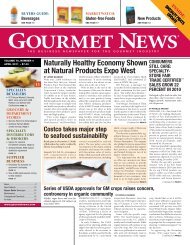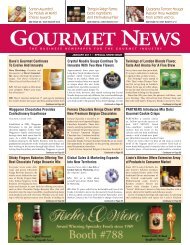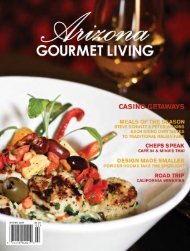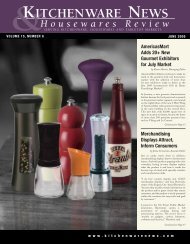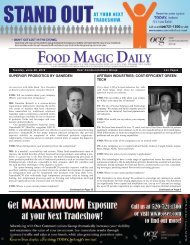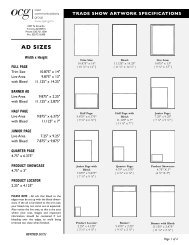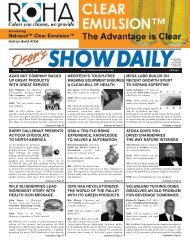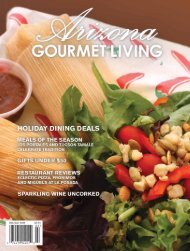June 2012 - Oser Communications Group
June 2012 - Oser Communications Group
June 2012 - Oser Communications Group
Create successful ePaper yourself
Turn your PDF publications into a flip-book with our unique Google optimized e-Paper software.
GOURMET NEWS JUNE <strong>2012</strong> www.gourmetnews.com CHEESE 29<br />
Cello Riserva from Arthur Schuman<br />
Arthur Schuman is proud to introduce<br />
Cello Riserva, a truly authentic family of<br />
award-winning Italian and Italian-style<br />
cheeses. Cello Riserva Artisan Parmesan,<br />
Copper Kettle Parmesan, Traditional Romano<br />
and Hand Crafted Asiago are all<br />
made at Arthur Schuman's Lake Country<br />
Dairy facility, the preeminent hard cheese<br />
producer in the United States.<br />
For Cello Riserva cheese makers, quality<br />
isn’t just part of the job––it is an obsession.<br />
The classic Italian flavors of these cheeses<br />
stem from craftsmanship dating back many<br />
centuries, and from the water and mineral<br />
character of Wisconsin’s rich land that<br />
echoes the lush pastures of northern Italy.<br />
A fourth generation family-run company,<br />
immersed in tradition and regarded as a<br />
leader in the hard cheese industry, Arthur<br />
Schuman is committed to delivering the<br />
expertise of Italian cheese making in every<br />
wheel of Cello Riserva cheese. Cello Riserva<br />
is available in exact and random<br />
weight wedges, wheels with repacks,<br />
cups, and exact and random weight bags<br />
in order to meet all of your needs.<br />
For more information about these<br />
award-winning cheeses, please contact<br />
Arthur Schuman Inc. at 40 New Dutch<br />
Lane, Fairfield, NJ 07004 or on the<br />
web at www.arthurschuman.com and<br />
www.cellocheese.com. The company can<br />
be reached by phone at 973-227-0030,<br />
fax at 973-227-1525 or email at<br />
info@arthurschuman.com.<br />
A new range of natural cheese from New Zealand<br />
Fonterra USA brings you cheese from the<br />
dairy heartland of New Zealand. The range<br />
includes Cheddar, Egmont and Swiss,<br />
from cows that are grass-fed year round<br />
and with no rBST.<br />
Fonterra’s Cheddar is naturally robust in<br />
flavor, with a dense mouth feel. The mild<br />
type is aged three to six months, with a soft<br />
texture suited for sandwiches and cooking.<br />
Sharp and vintage are aged up to three<br />
years, full-flavored, crumbly, marbled with<br />
salt crystals and with a smooth creamy finish,<br />
hand-selected by our Cheddar masters.<br />
Egmont is a cheese unique to New<br />
Zealand. Soft and mild, similar in flavor to<br />
Jack. Great for kids’ snacks, sandwiches<br />
and salads. When blended with mozzarella<br />
or Cheddar, it creates a unique and tasty<br />
pizza topping.<br />
Fonterra has taken the classic Swiss<br />
cheese and added a New Zealand twist.<br />
Sweet and nutty as you’d expect, but with<br />
the same robustness as its Cheddar. A<br />
great addition to a cheeseboard, it pairs<br />
wonderfully with Sauvignon Blanc.<br />
Imported by Fonterra USA. Available in<br />
44 pound, 10 pound, 5 pound, 1 pound or<br />
8 ounce sizes; block, sliced or cubed;<br />
shelf life 9 months. For inquiries, call<br />
954-958-0329.<br />
Only some 5 percent of Parmigiano-Reggiano<br />
supply affected by quake<br />
The Parmigiano-Reggiano supply and<br />
quality remains consistent and will not be<br />
seriously affected by the earthquake in<br />
part of its production zone in May, according<br />
to Nancy Radke, director of the U.S.<br />
Information Office for the Consorzio del<br />
Formaggio Parmigiano-Reggiano.<br />
The epicenter of the quake was in the<br />
northeastern area of the production zone, in<br />
Bologna and Modena, with some damage<br />
in Mantua. A total of 10 producers (out of<br />
hundreds accredited) were affected at their<br />
warehouses, but only one has been affected<br />
in his production area. Damage is still being<br />
assessed, but preliminary estimates put it at<br />
about 300,000 wheels. Estimates of<br />
400,000 may include wheels of Grana<br />
Padano, produced in an adjacent area that<br />
was also affected, according to Radke.<br />
"At any given time there are<br />
about 6 million wheels in some<br />
state of aging," Radke told<br />
Gourmet News. "So at<br />
300,000 that is only about 5<br />
percent of available commercial<br />
production." Out of that 5<br />
percent, about 2.5 percent will<br />
probably be able to be saved.<br />
Wheels still uncertified (under<br />
one year of aging) will be used<br />
as hard grating cheese for<br />
foodservice applications, but<br />
not bearing the official seal.<br />
Others that have internal<br />
cracking will be sent to<br />
Consorzio-licensed facilities to be prepacked<br />
into wedges, while wheels that<br />
prove undamaged will be sent to other facilities<br />
to continue aging.<br />
"At this point it is important to protect<br />
the integrity of the certification," Radke<br />
said. For this reason, the Consorzio has<br />
sent sanitation inspection teams and representatives<br />
to inspect the affected facilities<br />
and work with the producers to get<br />
back up to speed.<br />
"Rumors of milk quality being affected<br />
are unfounded," she said further. Those<br />
interested in following the issue can consult<br />
the Consorzio’s blog at www.parmesan.com.<br />
The consumer site was also<br />
launched in May, and features recipes,<br />
blog entries and other content to promote<br />
authentic Parmigiano-Reggiano.<br />
Pecorino Sardo<br />
Pecorino is a family of hard Italian cheeses<br />
made from ewe’s milk. The word derives<br />
from pecora, meaning ‘sheep’, also from<br />
the Latin pecorosus, meaning cattle.<br />
Pecorino sardo, also known as fiore<br />
sardo, is a firm cheese from the island of<br />
Sardinia, made from the milk of the local<br />
Sardinian sheep. It was awarded Denominazione<br />
d’Origine status in 1991 and<br />
granted Protected designation of origin<br />
(PDO) protection in 1996, the year the certification<br />
was introduced. Its flavour is different<br />
from that of Pecorino Romano,<br />
which is also made on the island. Sardo is<br />
richer, while romano is much more biting<br />
and salty. Pecorino sardo is delicious in<br />
contexts where romano could overpower,<br />
such as in pesto—Ligurian pesto alla genovese<br />
is traditionally made with a mixture<br />
of Pecorino sardo and Parmigiano-Reggiano—or<br />
with fruit.<br />
Pecorino sardo is an uncooked hard<br />
cheese made of fresh whole sheep’s milk,<br />
curdled using lamb or kid rennet. The mixture<br />
is poured into moulds to give the<br />
cheese its characteristic shape. After a<br />
brief period in brine, the moulds are lightly<br />
smoked and left to ripen in cool cellars in<br />
central Sardinia. The end product weighs<br />
an average of 3.5 kilos, sometimes a bit<br />
more or a bit less depending on conditions<br />
of manufacture. The rind varies from deep<br />
yellow to dark brown, encasing a paste<br />
that varies from white to straw-yellow.<br />
Sharpness of flavor depends on length of<br />
maturation. It s most often found in the<br />
United States as a hard cheese, its more<br />
mature form.<br />
Lettieri is proud to import direct from<br />
Sardinia Corso Pecorino Sardo. For more<br />
information, call 415-657-3392.


